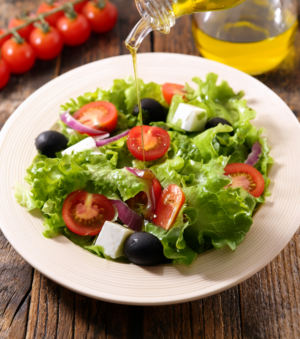Monounsaturated fatty acids: a key to longevity?

Imagine sitting in a small café on the Mediterranean coast on a sunny afternoon. In front of you is a colourful plate of fresh salad, dressed with a dash of golden olive oil. This scene is not only pleasing to the eye and the palate – it may also hold the secret to a longer and healthier life.
The Mediterranean diet is rich in monounsaturated fatty acids (MUFAs). MUFAs are a type of lipid, a group of mostly water-insoluble compounds. They serve as energy stores and are an important component of the membranes that surround our cells. In addition, they act as signalling molecules, carrying messages within the cell.1
MUFAs can accumulate in lipid droplets within cells. These were erroneously thought to be passive lipid stores, but today we know that they actually function as cell organelles with important roles in metabolism.2 In humans, the effect of lipid droplets and MUFA accumulation on lifespan is less clear. Studies that examine the relationship between diet or other habits and health and lifespan – so-called correlation studies – have found supporting evidence that people who frequently consume olive oil are also often healthier or live a little longer.3-6 However, it is not yet possible to say with certainty whether eating a Mediterranean diet can help us live longer, or whether other factors in the lives of the people studied were responsible – for example, it may simply be that people who live longer enjoy Mediterranean food.

Dr Katharina Papsdorf, a group leader at the Centre for Healthy Ageing (CHA) and Institute of Molecular Biology (IMB) in Mainz, is working to understand the role of MUFAs in ageing. When she fed nematode worms with MUFAs, they lived longer than worms that had not been given MUFAs. The more lipid droplets a worm had in its intestinal tissue, the longer it lived.7
‘It was exciting to see that lipid stores in the cell are needed for worms to have a long life,’ explains Dr Papsdorf. What's more, the number of lipid droplets could even predict the lifespan of the worm. Dr Papsdorf is now working to understand the molecular mechanisms behind this phenomenon.
Could ageing research in worms really be relevant for humans? At only a millimetre long, the nematode worm C. elegans seems vastly different from humans at first glance. Nevertheless, humans and worms share many basic disease- and ageing-related genes. Because of this, C. elegans has become a popular model organism in ageing research. A major advantage is that it lives for only about 20 days, allowing scientists to study the effects of diets or other treatments on lifespan within a very short timeframe.4 ‘We can specifically examine the effect of individual components in the diet and their direct influence on lifespan. In humans, who live much longer, this is extremely difficult,’ explains Dr Papsdorf.
Through studies into the link between MUFAs, diet and lifespan, Dr Katharina Papsdorf’s work helps us to better understand how healthy fats could contribute to longevity – and perhaps also one day in humans. So perhaps every drop of olive oil on your salad holds a little secret for a longer, healthier life.
Interview conducted by Janine Brück, PhD student at the Institute of Molecular Biology (IMB)
Bohnet M, Ullmann F, eds. Ullmann's encyclopedia of industrial chemistry. 6., completely revised ed. Weinheim: Wiley-VCH; 2003.
Martin S, Parton RG. Lipid droplets: a unified view of a dynamic organelle. Nat Rev Mol Cell Biol. 2006;7(5):373-378. doi:10.1038/nrm1912
Zhang S, Li F, Zhou T, Wang G, Li Z. Caenorhabditis elegans as a Useful Model for Studying Aging Mutations. Front Endocrinol (Lausanne). 2020;11:554994. doi:10.3389/fendo.2020.554994
Cao X, Xia J, Zhou Y, et al. The Effect of MUFA-Rich Food on Lipid Profile: A Meta-Analysis of Randomized and Controlled-Feeding Trials. Foods. 2022;11(13). doi:10.3390/foods11131982
Bozzetto L, Prinster A, Annuzzi G, et al. Liver fat is reduced by an isoenergetic MUFA diet in a controlled randomized study in type 2 diabetic patients. Diabetes Care. 2012;35(7):1429-1435. doi:10.2337/dc12-0033
Roche HM, Zampelas A, Knapper JM, et al. Effect of long-term olive oil dietary intervention on postprandial triacylglycerol and factor VII metabolism. The American journal of clinical nutrition. 1998;68(3):552-560. doi:10.1093/AJCN/68.3.552
Papsdorf K, Miklas JW, Hosseini A, et al. Lipid droplets and peroxisomes are co-regulated to drive lifespan extension in response to mono-unsaturated fatty acids. Nat Cell Biol. 2023;25(5):672-684. doi:10.1038/s41556-023-01136-6
